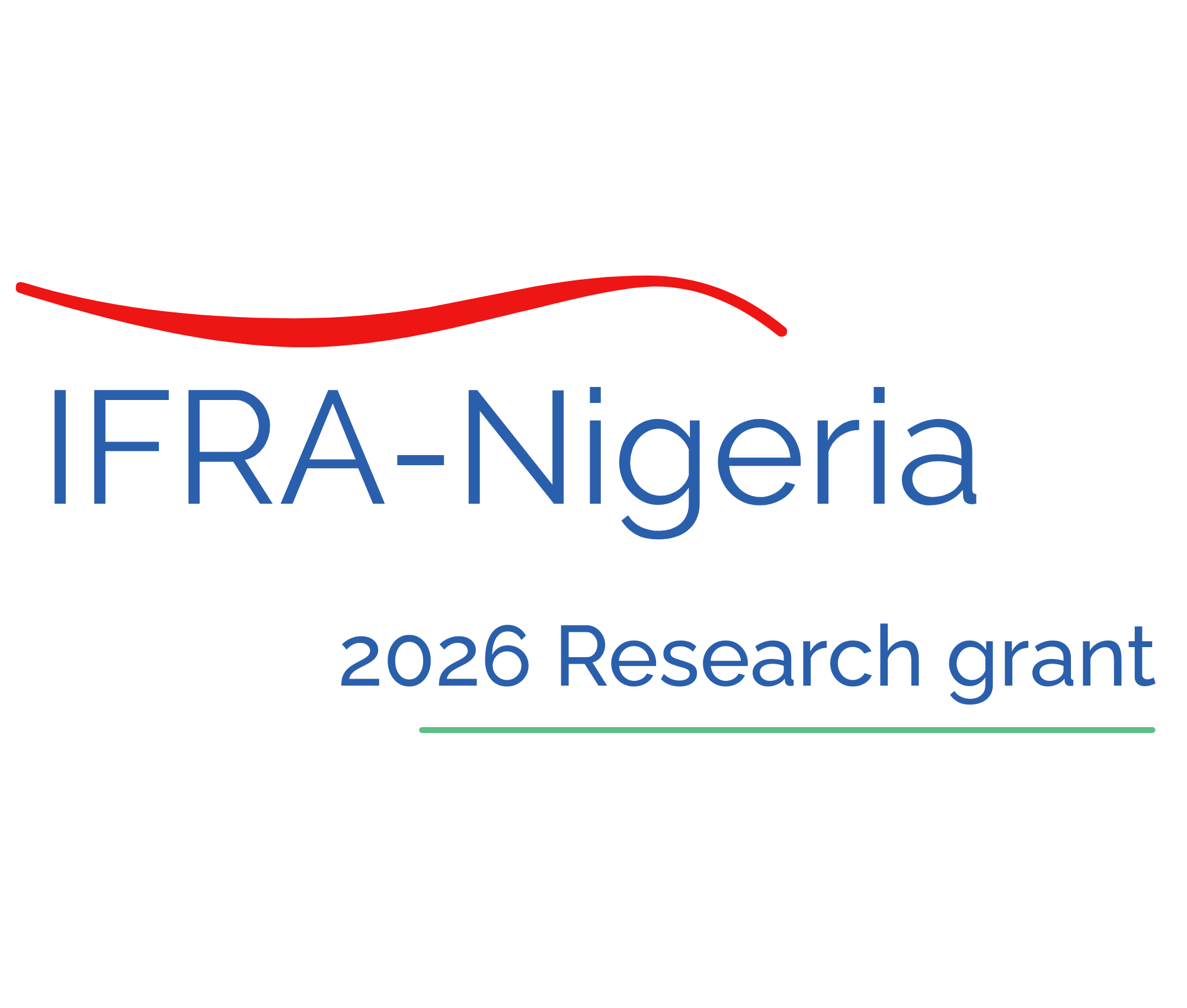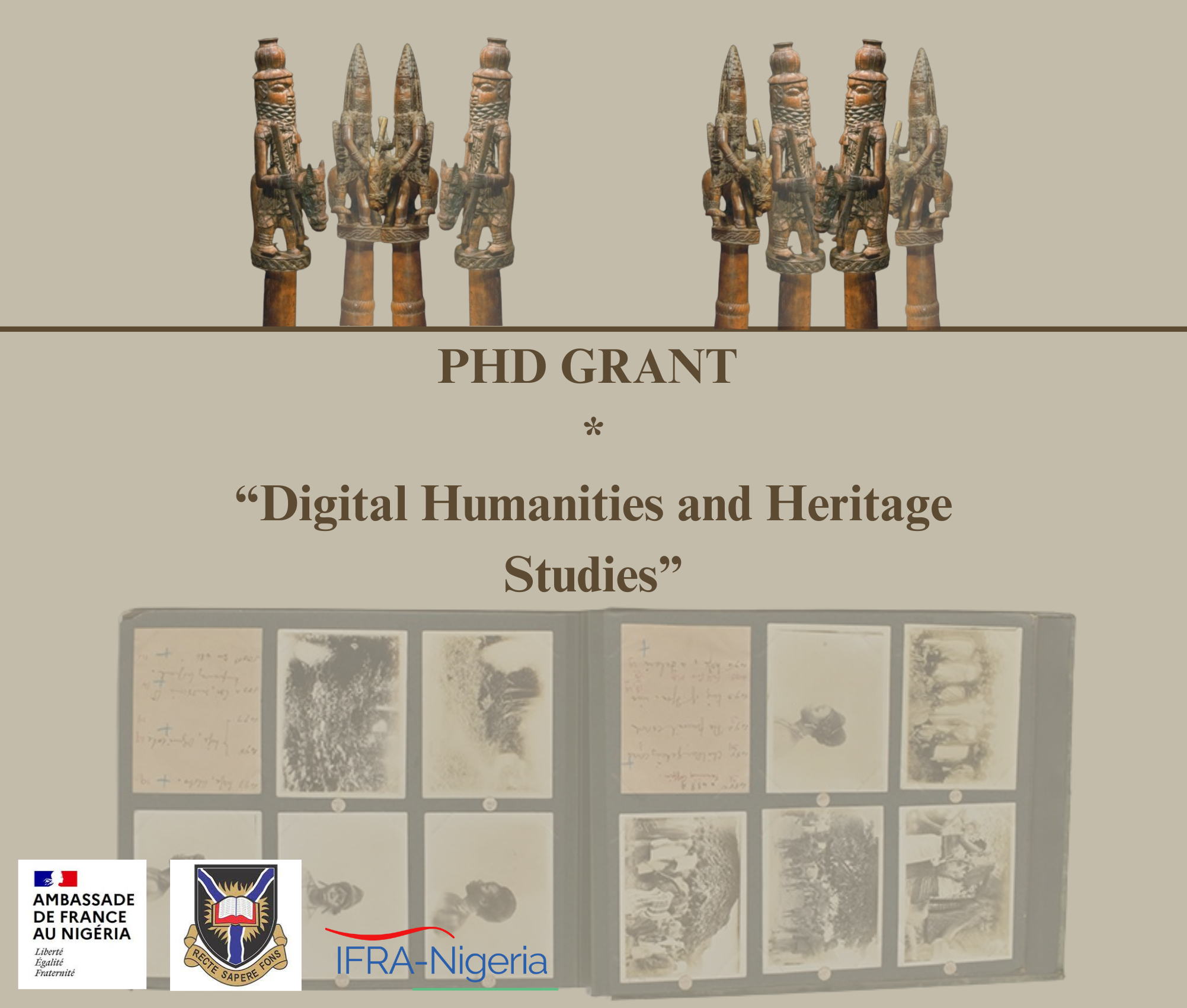 IFRA-Nigeria is opening its call for 2026 Research Grants!
IFRA-Nigeria is opening its call for 2026 Research Grants!
Open to master's student, doctoral students, postdoctoral and researchers working in humanities and social sciences on a country under IFRA-Nigeria's geographical mandate (Nigeria, Cameroon, Benin, Togo, Ghana, Liberia, Gambia, Niger, Chad and Burkina Faso). We accept applications in French or English.
Download the full call or read more below
Deadline for application: 30 November 2025.
Continue Reading
 On 24 April, join the Thursday Film Seriesfor a screening of "Speak Up for Freedom", a powerful documentary directed by Clément Sibony. This event, in collaboration with MIST (Mission of Intervention and Sensitisation against Trafficking) and supported by IFRA-Nigeria, sheds light on one of the most harrowing realities faced by Nigerian women in Europe — human trafficking.
On 24 April, join the Thursday Film Seriesfor a screening of "Speak Up for Freedom", a powerful documentary directed by Clément Sibony. This event, in collaboration with MIST (Mission of Intervention and Sensitisation against Trafficking) and supported by IFRA-Nigeria, sheds light on one of the most harrowing realities faced by Nigerian women in Europe — human trafficking.
The film follows six Nigerian women who, having survived trafficking and sexual exploitation, reclaim their voices through theatre. With legal justice out of reach, they stage a fictional trial, an act of defiance that transforms pain into power. Through this deeply moving documentary, we witness their journey of healing, storytelling, and resistance.
Joining us for the post-screening discussion is Dr Elodie Apard, board member of MIST, researcher and coordinator of the Life after Trafficking project. Together, we will explore the intersections of art, activism, and justice, reflecting on how creative expression can challenge oppressive systems and empower survivors.
This screening is more than just a film; it is a call to action. We invite you to engage, learn, and stand in solidarity with those whose voices have been silenced for too long.
Practical Information:
Date and time: 24 April, 4 pm
Location: Draper's Hall, Institute of African Studies, University of Ibadan
Attendance: free and open to all!


The two open-access, peer reviewed journals Sources and Revue d'Histoire Contemporaine de l'Afrique are planning a special double issue on the theme “Return(s) to Africa”, to be published in October 2026.
This topic is particularly relevant at a time when the African Union has placed the year 2025 under the banner of “justice for Africans and people of African descent through reparations,” and when African states are discussing and adopting laws to facilitate access to nationality for Afro-descendants. This issue aims to center the often implicit and little documented dimension of these mobilisations, that of the migration of Afro-descendants to Africa, commonly referred to under the expression Back to Africa.
Deadline for submission of proposals: 15/05/2025
Download the ToR in English / Téléchargez les TdR en français or check the Sources website!
 The Embassy of France in Nigeria is implementing the French Government Scholarship Programme, "France Excellence" among which are the "Séjours Scientifiques de Haut Niveau (SSHN, High-Level Scientific Stays)". Addressed to academic and research staff wishing to spend some time in a higher education or research institution in France, the SSHN also aim to be a tool to increase the cooperation with French institutions.
The Embassy of France in Nigeria is implementing the French Government Scholarship Programme, "France Excellence" among which are the "Séjours Scientifiques de Haut Niveau (SSHN, High-Level Scientific Stays)". Addressed to academic and research staff wishing to spend some time in a higher education or research institution in France, the SSHN also aim to be a tool to increase the cooperation with French institutions.
In 2023, 7 Nigerian researchers have been awarded this grant for a 2 to 4 weeks mobility. In 2024, the Embassy of France offered 7 scientific grants of one month each. In 2025, the number of visits funded may be higher, depending on the available budget, the duration of the visits.
To find out more about the eligibility criteria, timeline and to download the application form, visit the French Embassy's website.
Deadline for application: 26 April 2025
 IFRA-Nigeria is launching its annual call for research projects. The institute will be funding several research projects, individual or collective, focusing on social science in West Africa. This call is open to master's, doctoral and post-doctoral students, as well as researchers. Learn how to apply below!
IFRA-Nigeria is launching its annual call for research projects. The institute will be funding several research projects, individual or collective, focusing on social science in West Africa. This call is open to master's, doctoral and post-doctoral students, as well as researchers. Learn how to apply below!
Deadline : 2 April 2025
L'IFRA-Nigeria lance son appel annuel à projets de recherche. L'Institut financera plusieurs projets de recherche, individuels ou collectifs, portant sur les sciences sociales en Afrique de l'Ouest. Cet appel est ouvert aux étudiants en master, doctorat et post-doctorat, ainsi qu'aux chercheurs. Découvrez comment postuler ci-dessous !
Date limite : 2 avril 2025
Continue Reading
 The “French Institute for Research in Africa” (IFRA-Nigeria) based at the University of Ibadan, Nigeria, is funding up to two PhD students at the University of Ibadan as part of a project in digital humanities with a focus on heritage studies at the Lagos National Museum Archives. A co-supervision of University of Ibadan and IFRA Nigeria will be offered.
The “French Institute for Research in Africa” (IFRA-Nigeria) based at the University of Ibadan, Nigeria, is funding up to two PhD students at the University of Ibadan as part of a project in digital humanities with a focus on heritage studies at the Lagos National Museum Archives. A co-supervision of University of Ibadan and IFRA Nigeria will be offered.
Deadline for application : 15/03/2025
Learn more below and read the full proposal here.
Continue Reading
Entitled "Imaginaires en pandémie" (Pandemic imaginaries), the thematic dossier examines the novel political and ideological bricolages that emerged during and in the wake of the Covid-19 health crisis.
------------------------------------
La dernière livraison du
Journal des anthropologues, coordonnée par Monique Selim et Barbara Morovich, sort fraîchement de l'imprimerie.
Intitulé
"Imaginaires en pandémie", le dossier thématique interroge les bricolages politiques et idéologiques inédits qui ont émergé pendant et à la suite de la crise sanitaire du Covid-19.
Continue Reading
 Between the 18th of June and the 15th of July 2023, a research team led by Prof. Gérard Chouin worked on the Ife-Sunbgo Archeological Project. Besides the continuation of the usual annual archaeological excavation, two trainings took place (see below). The Ife-Sungbo team hosted the team of Her Excellency the Ambassador of France to Ife between the 3rd and 5th of July 2023. The team opened additional units of the excavation at both the Ita-Yemoo and Lujumo compound sites to study further the context of the different layers and types of pavements discovered.
Between the 18th of June and the 15th of July 2023, a research team led by Prof. Gérard Chouin worked on the Ife-Sunbgo Archeological Project. Besides the continuation of the usual annual archaeological excavation, two trainings took place (see below). The Ife-Sungbo team hosted the team of Her Excellency the Ambassador of France to Ife between the 3rd and 5th of July 2023. The team opened additional units of the excavation at both the Ita-Yemoo and Lujumo compound sites to study further the context of the different layers and types of pavements discovered.
Continue Reading

Please find here the call for applications for the Sciences Po Visiting Faculty Global Programme.
Sciences Po is calling for outstanding applications for visiting faculty from around the world. In the 2023-2024 academic year, Sciences Po will open two visiting faculty positions in the social sciences or humanities, for up to a semester-long each (6-weeks minimum).
Continue Reading
 Can you explain to us what the INFRAPATRI project is, what brings you to Ibadan and what is your role in this project?
Can you explain to us what the INFRAPATRI project is, what brings you to Ibadan and what is your role in this project?
INFRAPATRI is a program funded by the French National Research Agency (ANR), from March 2021 to March 2025. It is a program that I supervise within my research unit, PRODIG, based at the Campus Condorcet in Aubervilliers, France. The objectives of this program are to compare the relationships, knowledge, and attachments of city-dwellers and municipal authorities to plants in four cities in sub-Saharan Africa: Yaoundé in Cameroon, Ibadan in Nigeria, Porto-Novo in Benin Republic, and Dakar in Senegal. One hypothesis that we want to test in these four cities pertaining to these relationships to plants is that, in addition to the heritage policies that have been implemented in African cities and that are often focused on the built environment and, moreover, on colonial buildings, there may also be memorial attachments to plants by the inhabitants of these cities.
Continue Reading
 IFRA-Nigeria is opening its call for 2026 Research Grants!
IFRA-Nigeria is opening its call for 2026 Research Grants!
 On 24 April, join the
On 24 April, join the 

 The Embassy of France in Nigeria is implementing the French Government Scholarship Programme, "France Excellence" among which are the "Séjours Scientifiques de Haut Niveau (SSHN, High-Level Scientific Stays)". Addressed to academic and research staff wishing to spend some time in a higher education or research institution in France, the SSHN also aim to be a tool to increase the cooperation with French institutions.
The Embassy of France in Nigeria is implementing the French Government Scholarship Programme, "France Excellence" among which are the "Séjours Scientifiques de Haut Niveau (SSHN, High-Level Scientific Stays)". Addressed to academic and research staff wishing to spend some time in a higher education or research institution in France, the SSHN also aim to be a tool to increase the cooperation with French institutions. IFRA-Nigeria is launching its annual call for research projects. The institute will be funding several research projects, individual or collective, focusing on social science in West Africa. This call is open to master's, doctoral and post-doctoral students, as well as researchers. Learn how to apply below!
IFRA-Nigeria is launching its annual call for research projects. The institute will be funding several research projects, individual or collective, focusing on social science in West Africa. This call is open to master's, doctoral and post-doctoral students, as well as researchers. Learn how to apply below! The “French Institute for Research in Africa” (IFRA-Nigeria) based at the University of Ibadan, Nigeria, is funding up to two PhD students at the University of Ibadan as part of a project in digital humanities with a focus on heritage studies at the Lagos National Museum Archives. A co-supervision of University of Ibadan and IFRA Nigeria will be offered.
The “French Institute for Research in Africa” (IFRA-Nigeria) based at the University of Ibadan, Nigeria, is funding up to two PhD students at the University of Ibadan as part of a project in digital humanities with a focus on heritage studies at the Lagos National Museum Archives. A co-supervision of University of Ibadan and IFRA Nigeria will be offered. The latest issue of the
The latest issue of the  Between the 18th of June and the 15th of July 2023, a research team led by Prof. Gérard Chouin worked on the Ife-Sunbgo Archeological Project. Besides the continuation of the usual annual archaeological excavation, two trainings took place (see below). The Ife-Sungbo team hosted the team of Her Excellency the Ambassador of France to Ife between the 3rd and 5th of July 2023. The team opened additional units of the excavation at both the Ita-Yemoo and Lujumo compound sites to study further the context of the different layers and types of pavements discovered.
Between the 18th of June and the 15th of July 2023, a research team led by Prof. Gérard Chouin worked on the Ife-Sunbgo Archeological Project. Besides the continuation of the usual annual archaeological excavation, two trainings took place (see below). The Ife-Sungbo team hosted the team of Her Excellency the Ambassador of France to Ife between the 3rd and 5th of July 2023. The team opened additional units of the excavation at both the Ita-Yemoo and Lujumo compound sites to study further the context of the different layers and types of pavements discovered.
 Can you explain to us what the INFRAPATRI project is, what brings you to Ibadan and what is your role in this project?
Can you explain to us what the INFRAPATRI project is, what brings you to Ibadan and what is your role in this project?
Social Media
Mailing List